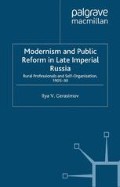Abstract
Not unlike their counterparts in the West, Russian Progressivist modernizers reached a point when the further advancement of social reform could be secured only by institutionalizing a broad public movement at the national level. They went through the stages of sacrificial amateur enthusiasm, expert counseling organized through professional corporations, and technologically enhanced mass-scale social engineering. In view of the gradual rapprochement between the economically concerned branches of the “government” and the “public,” traditionally anti-statist rural professionals faced the challenge of stabilizing their relationships with the state and, probably for the first time, clarifying to themselves and their counterparts what sort of greater community they were building. The logic of the public reformist movement implied a shift in the politics of modernity: the “apolitical politics” of indirect pressure through manipulating the public discourse on agriculture and winning over the support of the zemstvos and some government agencies gave way to direct claims for political representation. The answer to the crisis of the initial modernization project was found in the transformation “of the entire army of agronomists, and each of its members” into “citizens enjoying full rights, who in addition to their general responsibility have a special [responsibility] in the realm of [their] public and professional activity.”1
Access this chapter
Tax calculation will be finalised at checkout
Purchases are for personal use only
Preview
Unable to display preview. Download preview PDF.
Notes
See Ernest Gellner, Language and Solitude: Wittgenstein, Malinowski, and the Habsburg Dilemma (Cambridge: Cambridge University Press, 1998).
See Oleg Budnitskii, ed., Evrei i russkaia revolutsiia (Moscow: Gesharim, 1999), p. 293.
Vadim Kukushkin, From Peasants to Labourers: Ukrainian and Belarusan Immigration from the Russian Empire to Canada (Montreal: McGill-Queen’s University Press, 2007), pp. 33
See Kimitaka Matsuzato, “‘Obshchestvennaia ssypka’ i voenno-prodovol’st-vennaia sistema Rossii v gody Pervoi mirovoi voiny,” Acta Slavica Iaponica XV (Sapporo, Japan, 1997): 38–41.
Copyright information
© 2009 Ilya V. Gerasimov
About this chapter
Cite this chapter
Gerasimov, I.V. (2009). Nation as Motherland. In: Modernism and Public Reform in Late Imperial Russia. Palgrave Macmillan, London. https://doi.org/10.1057/9780230250901_9
Download citation
DOI: https://doi.org/10.1057/9780230250901_9
Publisher Name: Palgrave Macmillan, London
Print ISBN: 978-1-349-31088-3
Online ISBN: 978-0-230-25090-1
eBook Packages: Palgrave History CollectionHistory (R0)

